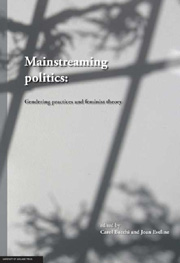Book contents
- Frontmatter
- Contents
- Preface
- Personal reflection
- Publisher's note
- List of authors and project personnel
- Acknowledgements
- Introduction
- 1 Gender/ing impact assessment: Can it be made to work?
- 2 Mainstreaming and neoliberalism: A contested relationship
- 3 Gender analysis and social change: Testing the water
- 4 What are we mainstreaming when we mainstream gender?
- 5 Approaches to gender mainstreaming: What's the problem represented to be?
- 6 Power, resistance and reflexive practice
- 7 Gender mainstreaming: The answer to the gender pay gap?
- 8 Gender analysis and community participation: The role of women's policy units
- 9 The invisibility of gendered power relations in domestic violence policy
- 10 Gender mainstreaming versus diversity mainstreaming: Methodology as emancipatory politics
- 11 University-public sector research collaboration: Mine the space, never mind the gap
- 12 Obeying organisational ‘rules of relevance’: Gender analysis of policy
- 13 Gender mainstreaming or diversity mainstreaming? The politics of ‘doing’
- Conclusion A politics of movement
- Author Index
- General Index
1 - Gender/ing impact assessment: Can it be made to work?
Published online by Cambridge University Press: 05 June 2012
- Frontmatter
- Contents
- Preface
- Personal reflection
- Publisher's note
- List of authors and project personnel
- Acknowledgements
- Introduction
- 1 Gender/ing impact assessment: Can it be made to work?
- 2 Mainstreaming and neoliberalism: A contested relationship
- 3 Gender analysis and social change: Testing the water
- 4 What are we mainstreaming when we mainstream gender?
- 5 Approaches to gender mainstreaming: What's the problem represented to be?
- 6 Power, resistance and reflexive practice
- 7 Gender mainstreaming: The answer to the gender pay gap?
- 8 Gender analysis and community participation: The role of women's policy units
- 9 The invisibility of gendered power relations in domestic violence policy
- 10 Gender mainstreaming versus diversity mainstreaming: Methodology as emancipatory politics
- 11 University-public sector research collaboration: Mine the space, never mind the gap
- 12 Obeying organisational ‘rules of relevance’: Gender analysis of policy
- 13 Gender mainstreaming or diversity mainstreaming? The politics of ‘doing’
- Conclusion A politics of movement
- Author Index
- General Index
Summary
Introduction: Carol Bacchi and Joan Eveline
This article was written prior to the commencement of the Gender Analysis Project, discussed in the Introduction. Reflecting Bacchi's policy background, it focuses primarily on connections between how policy is theorised and divergent models of gender analysis. This focus remains a theme throughout the chapters to follow, especially in Chapter 5. Eveline's influence is apparent towards the end of the article, where reference is made to ways of engaging policy workers in the organisational change process (see Eveline and Booth 2002; Eveline and Harwood 2002). Her breakthrough contribution to rethinking asymmetrical power relations between women and men as ‘the politics of advantage’ is also introduced (see Eveline 1994). The authors' shared commitment to recognising power as a generative force is captured in the term ‘gendering’ (Eveline 2005).
Bacchi's primary purpose in the article is to alert readers to the existence of different frameworks for gender analysis and to suggest that, in terms of prospects for progressive change, the framework adopted matters. She identifies conceptual limitations in the dominant mode of gender analysis, which she calls a ‘differences approach’. She also explores the potential for change in the Netherlands ‘gender relations’ approach, which starts from the premise that there are inequitable power relations between women and men.
Bacchi's major concern with both these models is the continuing tendency to consider policy as a reaction to the ‘problem’ of gender inequality.
- Type
- Chapter
- Information
- Mainstreaming PoliticsGendering Practices and Feminist Theory, pp. 17 - 38Publisher: The University of Adelaide PressPrint publication year: 2010
- 1
- Cited by



